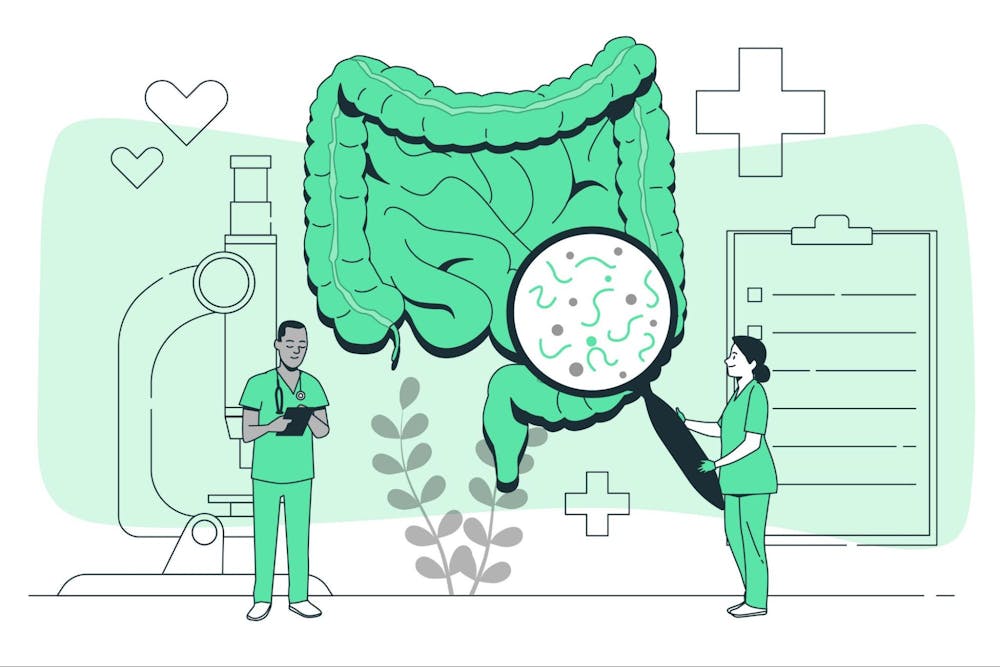Do you know that the health of your gut plays a vital role in your overall well-being? Yes, it’s true. The degree of inflammation in your body can be greatly impacted by the stomach condition, which can have a significant impact on your health too. If inflammation is not controlled, it can cause many health issues. This is why we are going to tell you 13 easy ways to reduce inflammation and improve your gut health. The best gut health treatment India also advises these steps to improve gut health naturally. You can take control of your gut health and lead a healthier and more comfortable life by paying attention to these suggestions. So let's get started and learn how to improve gut health and inflammation through lifestyle changes.

Recommended: The Connection Between Gut Health and Fatty Liver Disease
Importance Of Taking Care Of Gut Health
Healing gut health is of paramount importance, as it serves as the foundation for our overall well-being. The gut, often referred to as the "second brain," is home to trillions of bacteria that make up the gut microbiome. This intricate ecology is essential for many biological processes. These processes include digestion, nutrition absorption, immune system control, and even mental wellness. When our gut is healthy, it supports a balanced immune system and proper digestion. Healthy gut bacteria can also reduce the chance of developing obesity, diabetes, and heart disease. It also helps regulate inflammation levels in the body. As imbalances in gut health can contribute to chronic inflammation, which has been linked to a wide range of health issues. Therefore, you must take utmost care of your gut health to live a fulfilling life.

How Inflammation Can Affect Your Gut Health?
According to research, the gut microbiome is home to a sizeable amount of our immune system—roughly 70%. Our immune system differentiates between our own cells and foreign cells to protect our body against invaders. Sometimes the immune system can become overactive and launch immunological reactions.

This ongoing overreaction causes inflammation. The integrity of the gut lining may be compromised and the balance of gut bacteria may be upset from this continuous inflammation. As a result, endotoxins and other unwanted byproducts of bacteria can enter the bloodstream. It causes the immune system to view them as threats and starts a never-ending cycle of chronic inflammation. Therefore, you must take proactive steps to improve gut microbiome and decrease inflammation.
Also Read: The Secret to Healing Gut Health and Preventing Disease
Signs of Poor Gut Health and Inflammation
- Digestive issues
- Food intolerances or sensitivities
- Chronic fatigue
- Skin problems
- Joint pain and stiffness
- Anxiety or Depression
- Weakened immune system
- Unexplained weight gain or loss
13 Best Ways To Improve Gut Health
Opt For An Anti Inflammatory Diet Plan
Deciding to follow an anti inflammatory diet meal plan can be a wonderful strategy to improve the health of your gut. This kind of gut health diet focuses on eating foods that reduce inflammation, which is connected to many health problems. Include foods like fruits, vegetables, and whole grains in your diet to provide your body with the nutrients it needs to function properly.
Avoid Trigger Foods
It's important to avoid meals that may cause intestinal inflammation. These foods may damage gut health and make you feel uncomfortable. You should eliminate foods from your diet for two to three weeks that you feel may be a cause of your digestive problems. Throughout this period, pay special attention to any change you notice. Following the elimination phase, you can reintroduce these foods into your diet gradually for two to three days. Pay close attention to any specific symptoms that may reappear. This process can help you in determining which foods may be contributing to gut inflammation.
Manage Your Stress Levels
Stress has been linked to inflammation. Hence, finding things that might help you relax, even for a short while, is one of the best things to improve gut health. No matter if you are comfortable doing yoga, going on a walk, or just taking deep breaths, all these activities contribute to good health.
Start Doing Regular Exercise
Regular exercise can improve gut motility, improve digestion, and improve overall gut function. The muscles in the digestive system are stimulated by exercise, which makes it easier for food to pass through the intestines. Exercise encourages the muscles in the digestive system, making it easier for food to pass through the intestines. In addition, regular exercise has been shown to reduce inflammation throughout the body, including the gut. Whether it's going for a brisk walk, jogging, or cycling, making an exercise routine that you enjoy can improve your gut health.
Drink Enough Water
Maintaining hydration promotes healthy digestion. It supports the smooth movement of food through the intestines. Water eliminates toxins and waste from the body helps in digestion and vitamin absorption. It also helps to maintain the moisture and mucus lining in the gut. Try to have a glass of water with each meal, and keep a water bottle with you all day to make sure you're getting enough fluids.
Improve Your Sleep Quality
Your gut health and inflammation can both be improved by getting restful sleep. Your body, especially your digestive system, can rest and repair itself when you get enough good sleep. Lack of sleep has been associated increased gut inflammation, which can result in many digestive problems. Aim for 7-9 hours of uninterrupted sleep every night to give your body the chance to repair, control inflammation, and promote a healthier gut.
Consume Your Meals Slowly
Eating slowly helps your body effectively digest and absorb the nutrients from the food you eat. Chewing food thoroughly and savoring each bite aids in the breakdown of food and promotes better digestion. Eating slowly helps you control your weight and prevent overeating. So, make this a practice to enjoy the flavors of your food and improve gut health.
Limit Processed Foods
The chemicals, preservatives, and artificial components found in processed foods are bad for the gut. These foods often have little nutritious content and high levels of bad fats, carbohydrates, and sodium. Regularly consuming them can disrupt the balance of good bacteria and cause inflammation in the gut. Switch to foods that reduce inflammation in the body and support a healthier gut.
Limit Intake Of Added Sugars
Limiting your intake of added sugars is crucial for taking control of your gut health and well-being. Your gut health may suffer if you consume excessive amounts of added sugar. It may result in an unbalanced bacterial population in the gut, which may worsen digestive issues like bloating, gas, and diarrhea. High consumption of added sugars can also slow the growth of good bacteria in the stomach.
Reduce Alcohol Consumption
Your digestive system may suffer if you drink alcohol. Alcohol can irritate and harm our digestive system's lining when we consume it too much. This may result in issues including inflammation, heartburn, and stomach ulcers. Excessive alcohol use can also make it more difficult for our bodies to absorb the vitamins and minerals they get from our food. So, you must limit alcohol drinking and opt for healthy fruit juices.
Avoid Smoking
Smoking has several negative consequences on our general health, including our digestive system. The damaging compounds in cigarettes can cause direct injury to the lining of our digestive tract. It can result in inflammation. This inflammation may interfere with digestion and upset the normal balance of bacteria in our gut. Smoking also lowers immunological function, which makes it more difficult for the body to fight off infections. This is the reason you must say no to smoking.
Increase Intake Of Omega-3 Fatty Acids
Increasing your consumption of plant-based omega-3 fatty acids is a beneficial step in improving gut health. These fats help in reducing intestinal inflammation. Omega-3 fatty acids also encourage the development of good bacteria in the stomach, which is crucial for healthy digestion.
Seek Professional Guidance
Making lifestyle changes and following a healthy diet is crucial for your gut health. But along with that, you should consult a good healthcare professional who can provide valuable expertise. They can personalized recommendations to help improve your gut health. They can identify your condition, and determine the underlying reasons for intestinal inflammation. Depending on the severity and nature of your disease, they might suggest you a treatment plan that will make your health better.
5 Indian Foods That Reduce Inflammation In The Body
Turmeric
This bright yellow spice includes curcumin. This compound is known for its powerful anti-inflammatory qualities. Thus. Adding turmeric to your inflammation diet plan can help you improve your gut health.
Ginger
Every Indian household knows how to use ginger in their recipes and morning tea. Ginger has been known for its medicinal properties since ancient times. It includes gingerol, a substance with anti-inflammatory properties. That is why adding ginger to your gut health meal plan will provide relief from inflammation.
Garlic
Some people don’t like the pungent smell of garlic, but it can make your food delicious and healthy. It has sulfur compounds that help in reducing inflammation in the body. So, if you want to reduce your gut inflammation you should include it in your diet to improve gut health.
Cinnamon
The aromatic spice cinnamon also has anti-inflammatory qualities. It is one of the best foods that help reduce inflammation. Antioxidants included in cinnamon have anti-inflammatory and health-improving properties. You can sprinkle cinnamon on your curries to enjoy its taste as well as its health benefits.
Indian gooseberry
Indian gooseberry, sometimes referred to as amla, is a fantastic source of vitamin C and antioxidants. It contains anti-inflammatory qualities that can help in preventing inflammation-related diseases. You should include it in your daily diet to improve your gut health and immune system.
Final Thoughts –
You should make your gut health a priority to improve your gut health. You can improve your gut health and reduce inflammation by implementing these 13 strategies. Always keep in mind that small initiatives taken by your might result in positive changes. You may improve your digestion, immune system, mental health, and even your skin by taking care of your gut. You can encourage good gut function by taking care of your gut through gut health foods, stress management, and daily exercise. So, commit today to giving our gut health top priority. Start making these changes today, and your gut will thank you for it in the long run.
Frequently Asked Questions-
Does gut health affect inflammation?
Yes, the level of inflammation in your body is greatly influenced by intestinal health. Gut health issues can cause chronic inflammation, which can result in many health issues
What are the symptoms of poor gut health and inflammation?
Signs of digestive issues may include food intolerances, skin disorders, and frequent infections.
How to reduce inflammation in gut?
To get rid of inflammation you should focus on consuming foods that heal gut inflammation, and reduce your stress.
What foods heal gut inflammation?
Consuming Fiber-rich fruits and vegetables is one of the best way to improve gut health.
Can gut imbalances cause inflammation in other parts of the body?
An imbalance in the gut can cause systemic inflammation that affects many organs and systems. It contributes to chronic illnesses including heart disease and autoimmune diseases.
How can I improve gut health and reduce inflammation naturally?
Focus on a healthy diet that's high in fiber, control your stress levels, and stay away from processed meals and refined sugars.
Can stress impact gut health and inflammation?
Yes, long-term stress can affect gut bacteria. It can cause a leaky gut, and contribute to inflammation.
Can antibiotics disrupt gut health and lead to inflammation?
Antibiotics are crucial for treating infections, but they can also upset the balance of good bacteria in the stomach. It may result in imbalances and inflammation in the gut.
How long does it take to improve gut health and reduce inflammation?
Each person responds differently to lifestyle changes. With a consistent schedule, you will be able to notice improvements in gut health within a few weeks to a few months.
When should I seek professional help for gut health and inflammation issues?
If you have serious gut health issues or symptoms of inflammation, it is best to speak with a healthcare provider.




